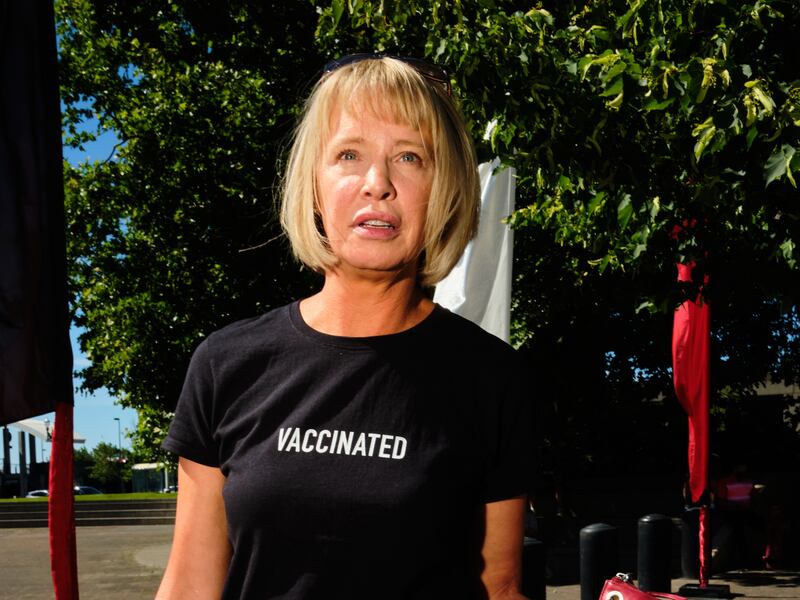For some Portlanders, the COVID-19 pandemic hasn’t felt so far away since February 2020. For others, a lurking fear persists—the possibility of a coronavirus variant so severe it overwhelms vaccinations.
Who’s right?
WW asked three experts at Oregon Health & Science University whether the pandemic was over in this state, and what threat the Delta variant poses to Oregonians. Currently, a mere 5% of COVID-19 cases in Oregon are of the Delta variant.
In Oregon, which has seen 7 in 10 adults take at least a first dose of the vaccines, cases have been declining since the late-April surge. Oregon ranks 12th in the nation for fully vaccinated residents. But taking into account immunity by contracting COVID-19 or getting vaccinated, Oregon isn’t looking as good.
Plenty of Oregonians never got sick or vaccinated—so they’re still ripe for infection.
“We didn’t have a lot of previous infection; that makes it so that we’re more close to the middle,” says Dr. Peter Graven of OHSU, who has provided the state’s leading models for predicting the course of the disease and sat for an interview with WW this week.
That means Oregon is further behind than other, less vaccinated states in its efforts to reach herd immunity, the point at which the disease is no longer likely to spread.
“Where we are now is that COVID is largely a preventable disease for those who have access to vaccine,” says Dr. Renee Edwards, OHSU’s chief medical officer, who responded to questions via email.
WW also interviewed Dr. William Messer, a virologist, epidemiologist and associate professor at OHSU and PSU who worked on two of the vaccine trials for Johnson & Johnson and AstraZeneca.
Here’s where they say we stand.

WW: Is the pandemic over?
Dr. William Messer: It’s not over is the short answer to that question. If you vaccinate 70% of three and a half million people, the population of Oregon roughly, you’re still looking at over a million susceptible individuals out there. That’s plenty of people to sustain ongoing transmission of this virus.
Dr. Peter Graven: For large groups of people in Oregon, it effectively is going to become not much of an issue for them. Am I going to say it’s over? No, but it’s not going to be the same kind of issue.
Should a vaccinated person care that the pandemic isn’t over for some people?
Dr. Renee Edwards: As long as there remain large parts of the world that do not have access to vaccine, there will be significant risk for the development of variants that may slip through the immunity barrier that we enjoy in Oregon and in the U.S. with our current vaccination. So while our restrictions have been eased and our case numbers down, the pandemic is certainly not over.
Messer: If you’re vaccinated and hanging out with a lot of other vaccinated people, you really don’t need to worry so much about this next surge, but remember that the protection from your vaccine is really a probabilistic thing.
Is there going to be another surge?
Edwards: There is risk for Oregon in those areas where vaccination rates remain low—99% of the hospitalized and severe cases of COVID, some of which lead to death, are occurring in unvaccinated Oregonians. We will continue to see spikes in unvaccinated populations, especially as the more infectious and significant variants increase in Oregon, but these will be much smaller and more local spikes as opposed to the statewide spikes we previously experienced. Our greatest vulnerability lies in our unvaccinated population.
Graven: In Vermont, they have a very high vaccination rate, much higher than ours, and the case rate that was similar to ours. Their COVID cases are going down, down, down. It doesn’t look like there’s going to be any waves there. Oregon has seen slow but steady decline. Are we going to go back up or are we going to hang tight for a while? The Delta variant’s probably going to be the biggest factor.

How much more likely is the Delta variant to spread than other variants?
Graven: For every person infected, they infect seven others. The original virus is about three—and seven is more than twice as transmissible.
Is the Delta variant more likely to cause worse outcomes?
Graven: It’s kind of been an open question if it’s a more severe disease once you do get it. I don’t have that built into my model. The hospitalization rate for COVID in Oregon has not gone down, which you might not expect if you’re vaccinating all your high-risk people. But there’s plenty of high-risk people out there.
What behaviors could still drive increases in cases?
Graven: Being indoors with others without a mask. Those are the ones where you get it. Your dining situation turned out to be a higher predictor of things. Other large events indoors, grocery stores: If you don’t have your mask on and you’re in close quarters with other people for an extended period of time, that’s been the name of the game the whole time. It’ll be about small clusters of unvaccinated people being indoors.
Are there essentially going to be no-go zones in Oregon for people who want to be low risk, even if they’re vaccinated?
Messer: If you were at risk, particularly if you are elderly, I would be very cautious. [One] stark example: I don’t want to pick on the Pendleton Round-Up, but that is in a part of the state that has a very low vaccination rate.
If the Pendleton Round-Up were fully open, I would never let my 80-year-old mother-in-law go to the Pendleton Round-Up. She’s been vaccinated, but she’s older. The vaccine elicits weaker immunity in that population. And if you’re going to go into a crowded setting where a vaccine uptake is about 30% overall and might be a lot lower in the younger crowd that goes to the roundup, I think I would be very hesitant to expose someone to that setting.
Correction: In a July 14 interview [”Seven Questions About the Delta Variant”], virologist Dr. William Messer of Oregon Health & Science University mischaracterized the odds of infection for vaccinated people. Messer initially said the odds were 1 in 20, but later clarified that the chances of contracting the Delta variant depend on a more complicated set of factors that vary with each specific circumstance and cannot be easily calculated.

